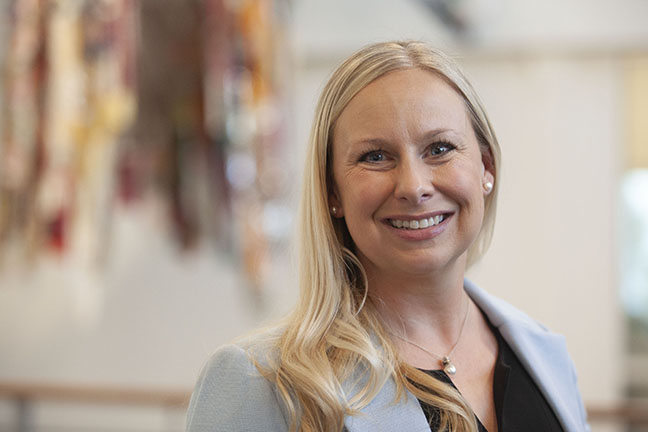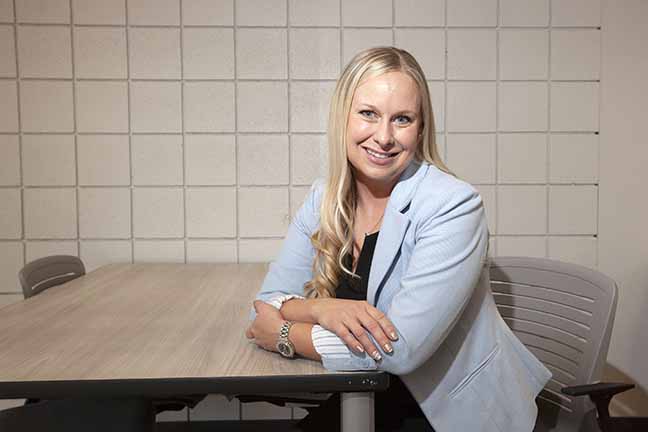A champion, and scientist, for breast cancer survivors

Jessica DeHart is an assistant professor in the School of Community and Global Health at Claremont Graduate University and the founder/CEO of the LYTE Foundation. Courier photo/Steven Felschundneff
By Tim Lynch | Special to the Courier
“Ring this bell
Three times well
Its toll to clearly say,
My treatment’s done
This course is run
And I am on my way!”
— Rear Admiral Irve Le Moyne, who began the tradition after completing treatment for head and neck cancer in 1996.
The now ubiquitous practice of ringing the bell can be momentous for a cancer patient, but after the well wishes fade, it can mark a new chapter filled with anxiety and helplessness — even survivor guilt.
“There’s often so much collateral damage,” said Jessica Clague DeHart, a molecular cancer epidemiologist and associate professor at Claremont Graduate University. “The physical, psychological, and emotional toll that survivors feel is real.”
Clague DeHart is committed to changing that for breast cancer survivors, including her own mother, who sought a way forward once her treatment ended at the City of Hope. The wrenching sense of frustration that Clague DeHart felt for not having the answers inspired her to found LYTE — Living Your Truth Empowered — a foundation laser focused on meeting the needs of the growing number of breast cancer survivors.
One of the most renowned research and advocacy organizations in the field is helping to make that possible.
The Dr. Susan Love Foundation for Breast Cancer Research has transferred two major studies on women’s health and breast cancer to LYTE. They are a gold mine of data that will attract researchers eager to explore the human dimension of health and cancer survivorship.
“It’s a tremendous gift that the team put so much work into, and now I get to open the gift and share it with the world,” said Clague DeHart, who had a deep connection with Susan Love and her eponymous foundation.

Jessica DeHart is an assistant professor in the School of Community and Global Health at Claremont Graduate University and the founder/CEO of the LYTE Foundation. Courier photo/Steven Felschundneff
The six-year Health of Women study was a first-of-its-kind international survey that asked more than 65,000 participants about their general health, environmental exposures, stress, quality of life, diet, and more, a series of questions that provided a trove of information found nowhere else.
The study, however, drew unexpected criticism from one group of participants: women with stage 4 breast cancer, said Clague DeHart, who was a member of the HOW study team as a graduate student.
“They let us know that some of the questions were harmful because we were phrasing things like, ‘In five years …” and they responded, ‘I’m not going to survive five years!’”
The candid feedback led to the Metastatic Breast Cancer Collateral Damage Project, a survey focused exclusively on stage 4 breast cancer patients. Participants share their experiences and provide insights on how they live with the disease, including details not commonly known in the medical community. The qualitative data from the ongoing project will prove invaluable as LYTE ramps up its services and outreach.
“I feel like my entire life experience — not just career, but life — has led up to this point,” said Clague DeHart, reflecting on her prominent and growing role in breast cancer survivorship.
How she got here seems counterintuitive.
“My parents met in London as drama majors, and I grew up in Claremont in an arts family,” she said. “I took up dancing, but I always had this need to know how things work, so I did my own science experiments, such as dyeing the kitchen sink blue to see what would happen.”
In her junior year at St. Lucy’s Priory High School in Glendora, Clague DeHart thought about pursuing dance at New York University’s Tisch School of the Arts, “and then I completely blew out my knee on opening night of a solo ballet performance.”
Unable to dance, she devoted her free time to driving her grandfather to USC’s cancer center for chemotherapy.
“I would bug the heck out of his oncologist. ‘How come he has pancreatic cancer? Do you think it’s this? Do you think it’s that?’ They said, ‘Have you thought about med school?’ They suggested that I apply to USC, where I could dance and study biology.”
Clague DeHart was in her grandfather’s room when he died.
“I was holding his hand, and he said in Spanish, ‘You’ve got to beat this thing.’”
She entered the inaugural class of USC’s health promotion disease prevention program. Her graduate studies then took her to the MD Anderson Cancer Center in Texas and City of Hope in Duarte, which provided the opportunity to train under two giants in the field, Drs. Susan Love and Leslie Bernstein.
“In meetings, they would disagree — often pointedly — but what would come out of it was beautiful. Susan in particular was very direct, which I loved. People would say you have to do this, and she was like, ‘No, no you don’t. We don’t have to do it that way.’
“I really loved that mentality of ‘Let’s turn the world upside down because what we’re doing isn’t moving the envelope forward. So, let’s move it.’”
Bernstein died in July 2022. Love died in July 2023. In a significant way, the torch has been passed to Clague DeHart. She is honored to have the opportunity to advance her mentors’ work, but she balances it with another major commitment: her family.
“From day one of being pregnant with my first son, I was told, ‘I thought you wanted to have a career,’ and I thought, oh, you did not just say that. You threw down the gauntlet.”
She advises young women interested in the science-life balance that they don’t need to choose one or the other.
“I say right off the bat that you can do both but be aware that it’s going to be hard. When I got into science, I was like, whoa, this is tough.”
She credits her husband, family, and a dean at Claremont Graduate University for encouraging her and for having her back. And she is grateful for the inspiration her two boys provide.
“They love asking Alexa my name so that they can hear that Alexa knows I’m a molecular epidemiologist and CEO of LYTE.”
LYTE is looking for volunteers to expand the Metastatic Breast Cancer Collateral Damage Project in historically underserved communities, where the experience and needs of breast cancer survivors often differs.
“We need as complete a picture as possible,” Clague Dehart said.
To learn more about LYTE or inquire about volunteering, email info@LYTEmpowered.org.









0 Comments